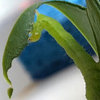Attacus atlas are hatching
karyn1
13 years ago
Related Stories

FUN HOUZZTaking Cover in a Former Nuclear Missile Silo
A Cold War relic is now a modern home, thanks to an Australian architect with a flair for the unusual
Full StoryMore Discussions
I had wanted to try Luna eggs but ended up with Atlas. They began hatching yesterday morning with a few stragglers in the evening and are starting up again this morning. I was concerned because they seemed to prefer wandering around the enclosures to eating but I'm seeing frass today so it appears that they got hungry. I've given them a choice of lilac, peach and citrus branches. It looks like they prefer the peach and lilac. This is the first time I've tried raising giant silk moths. I've raised plenty of butterflies and sphinx moths. I hope these do well. I was also sent some Samia ricini cocoons.


KC Clark - Zone 2012-6a OH
ladobe
Related Professionals
Citrus Heights Landscape Architects & Landscape Designers · Leawood Landscape Architects & Landscape Designers · Stamford Landscape Contractors · Wakefield Landscape Contractors · Edmond Landscape Contractors · Dinuba Landscape Contractors · East Hanover Landscape Contractors · Gurnee Landscape Contractors · Huntley Landscape Contractors · Mission Bend Landscape Contractors · Petaluma Landscape Contractors · Winter Park Fence Contractors · Bridgeport Window Contractors · Lakewood Window Contractors · Vashon Window Contractorssusanlynne48
karyn1Original Author
ladobe
KC Clark - Zone 2012-6a OH